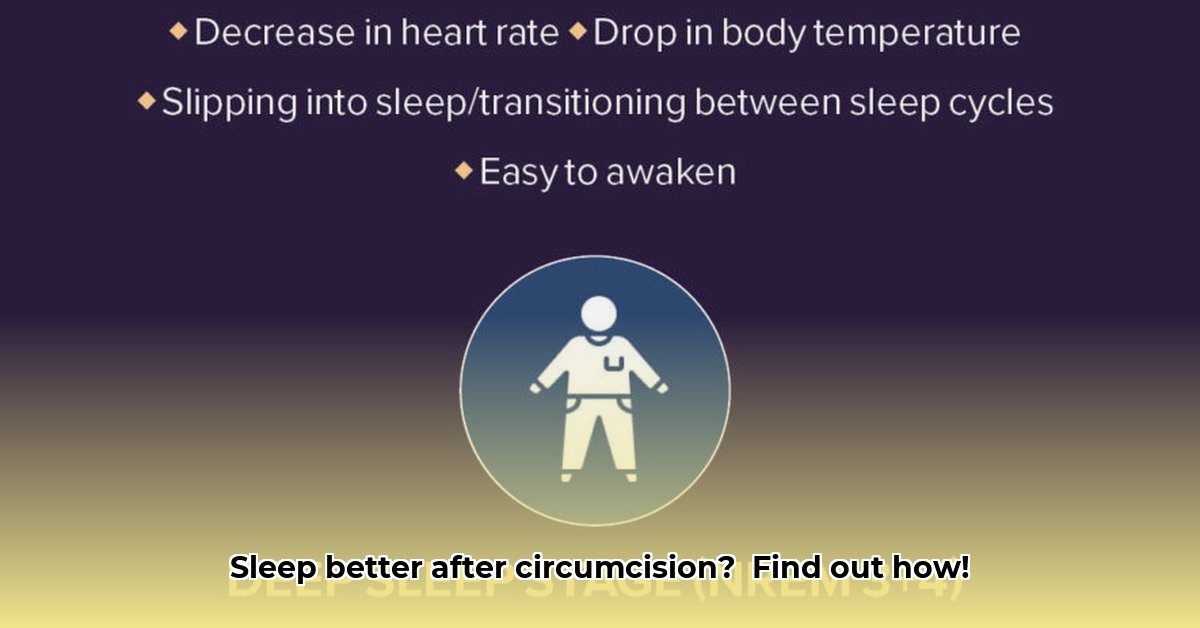
Is sleep evading you after your circumcision? Don't worry, tjom, it's completely normal to find sleep a bit of a struggle after the procedure. The discomfort can make even finding a comfortable position a challenge. But don't despair! This guide provides practical, step-by-step advice to help you get back to those sweet, uninterrupted Zzz's. We'll cover pain management, ideal sleeping positions, hygiene, and dealing with those pesky nighttime erections. Let's get you sleeping soundly again.
Easing the Discomfort: Pain Management for a Good Night's Rest
The first hurdle is managing the pain. Your doctor likely prescribed medication; take it exactly as instructed. Don't underestimate the importance of following your doctor's advice. If the pain isn't controlled, or if you have concerns about your medication, don't hesitate to call them for advice – changing the dosage or finding an alternative might be necessary. Over-the-counter pain relievers, like ibuprofen, could offer some extra help, but always check with your doctor or pharmacist first, especially if you’re already taking prescription medication. Remember, mak, effective pain management is essential for a good night’s sleep.
Finding Your Comfort Zone: Sleeping Positions for Healing
Finding the right sleeping position is key. Many men find sleeping on their back with their bottom gently elevated to be the most comfortable. Use extra pillows to support yourself – this helps keep the area airy and reduces friction. However, if back sleeping isn't your thing, try sleeping on your side, ensuring you’re not putting direct pressure on the healing area. Experiment – there's no one-size-fits-all solution!
Keeping Things Clean: Hygiene for a Speedy Recovery
Maintaining good hygiene is crucial for a faster recovery and better sleep. Gently wash the area as instructed by your doctor, using lukewarm water and a mild, unscented soap. Avoid harsh soaps or anything scented, as they can irritate the delicate skin. Pat the area dry gently – never rub! A clean, dry area significantly reduces the risk of infection and discomfort. This simple step makes a huge difference. Isn't it amazing how something so small can help so much?
Nighttime Surprises: Managing Erections
Nighttime erections are common, even more so after a circumcision. While they're a natural bodily function, they can definitely be uncomfortable. To minimise disruption, try emptying your bladder before bed. Reducing fluid intake a few hours before bedtime might also help, but remember to maintain adequate hydration throughout the day. If an erection causes pain, gently shift your position – sometimes curling into the foetal position can offer some respite. It's a temporary issue that will pass, you just need to navigate it.
Sleepwear and Bedding: Choosing Comfort
Choosing comfortable sleepwear and bedding dramatically improves sleep quality. Loose, breathable clothing is crucial. Soft cotton underwear is ideal. Avoid scratchy materials, as they will only add to your discomfort. A light blanket or sheet is often preferable to a heavy duvet, as overheating can lead to increased discomfort. Let the air circulate, and you'll feel much better.
Relax and Recharge: Mental Well-being and Sleep
Remember, this discomfort is temporary. Patience is key; healing takes time. Stress and anxiety can make pain feel worse, impacting your ability to sleep. Incorporate relaxation techniques into your routine: a warm bath, deep breathing exercises, meditation, or calming music before bed can significantly improve your sleep. Give yourself some time and listen to your body.
When to Seek Medical Advice: Knowing When to Call Your Doctor
While some discomfort is expected, it's crucial to know when to seek help. If you experience severe pain, excessive bleeding, or signs of infection (increased redness, swelling, pus, or a foul odour), contact your doctor immediately. Don't delay – your health is paramount, and early intervention is always best.
Your Personalised Sleep Plan: Key Takeaways
- Pain Management: Follow your doctor's instructions regarding pain medication. Don't hesitate to contact them, if necessary.
- Optimal Sleep Positions: Experiment with different positions (back, side, foetal) to find what provides the most relief.
- Hygiene: Maintain impeccable hygiene to prevent infection and facilitate healing.
With a little patience and these simple strategies, you can reclaim your restful nights. Remember, ou, this is a temporary phase; you'll be back to sleeping soundly in no time!